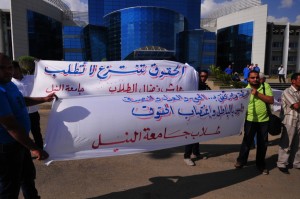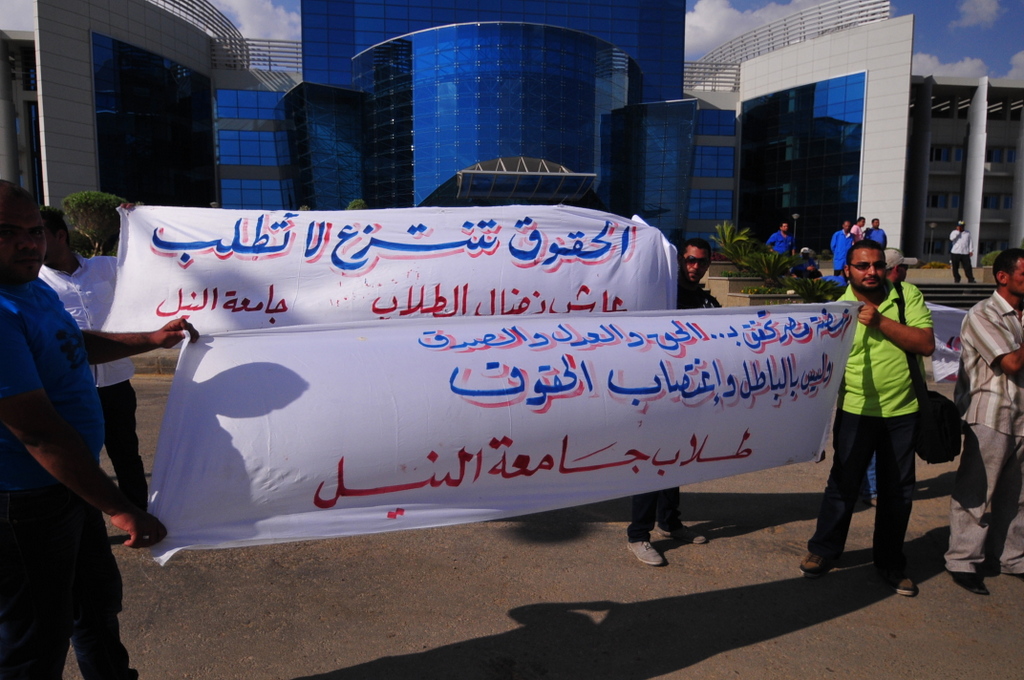
(DNE/ File photo/
Hassan Ibrahim)
Halting the implementation of the Supreme Administrative Court’s verdict in favour of Nile University is a “blatant attack” on judicial rules, the Arab Network for Human Rights Information (ANHRI) said on Sunday.
The Supreme Administrative Court upheld on 22 March a verdict reserving Nile University’s claim over a contested piece of land, ruling on a conflict that has dragged on for three years. The ruling turned down challenges to a verdict issued in April 2013 submitted by Zewail City of Science and Technology. The court also ruled in favour of the return of Nile University students to the contested buildings.
ANHRI accused “cronies of [former President Hosni] Mubarak of fighting to rob Nile University students of their right.” It urged Nobel Prize Laureate Ahmed Zewail, the founder of Zewail City, to “preserve his name and credibility and cease attempting to stand in the way of restoring rights.”
Zewail released a statement on Tuesday from California stressing he was confident that millions view Zewail City as a national project that will contribute to Egypt’s prestige. As for the allegations surrounding the land dispute with Nile University, Zewail promised that he is not trying to receive “any material or trading privileges” nor is he trying to “broker land”.
In Sunday’s press statement, ANHRI warned that the cabinet’s efforts to “stall” the implementation of the verdict “harm Egypt’s reputation and credibility domestically as well as internationally.”
On Saturday, interim Prime Minister Ibrahim Mehleb visited both Nile University and Zewail City and met with each institution’s chairman in an effort to find a solution to the ongoing crisis.
Mehleb stressed the importance of respecting court rulings. He called on Nile University and Zewail City to unite and “to put the nation’s best interest at heart in a manner which would create the suitable environment for upgrading scientific research in Egypt.”
ANHRI criticised Mehleb’s meetings, describing them as an attempt to “manoeuvre around the implementation of the court verdict,” adding that it is “a form of stalling not fitting of the prime minister”.
The Supreme Administrative Court’s initial April 2013 verdict gave Nile University the right to the disputed land. The ruling also necessitated that Nile University be declared a civil university. The university was recognised under the designation after the issuance of the law governing civil universities in 2009; the recognition is nevertheless yet to be ratified by the president.
The ruling contradicted a December 2012 decree from ousted president Mohamed Morsi, granting Zewail City apportionment of the land, which is public property that cannot be given to a private university.
Zewail City filed an appeal with the Supreme Constitutional Court objecting to the Supreme Administrative Court’s 2013 verdict. The university argued that the Giza Court, which is a civil court, ruled in favour of Zewail City in 2012. The City called for a ruling on the two conflicting verdicts.
Since the Supreme Administrative Court’s 2013 decision, Nile University students have not yet been granted access to the disputed buildings. Nile University students currently attend their classes at the Smart Village, which they describe as inadequate and lacking of laboratories and workshops. Zewail City accepted 300 students into the contested buildings at the beginning of its first academic year last September.


